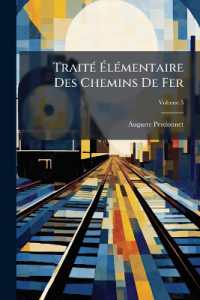- ホーム
- > 洋書
- > ドイツ書
- > Humanities, Arts & Music
- > History
Full Description
This book synthesizes in-depth bioarchaeological research into diet, subsistence regimes, and nutrition—and corresponding insights into adaptation, suffering, and resilience—among indigenous north-coastal Peruvian communities from early agricultural through European colonial periods.
The Spanish invasion and colonization of Andean South America left millions dead, landscapes transformed, and traditional ways of life annihilated. However, the nature and magnitude of these changes were far from uniform. By the time the Spanish arrived, over four millennia of complex societies had emerged and fallen, and in the 16th century, the region was home to the largest and most expansive indigenous empire in the western hemisphere.
Decades of Andean archaeological and ethnohistorical research have explored the incredible sophistication of regional agropastoral traditions, the importance of food and feasting as mechanisms of control, and the significance of maritime economies in the consolidation of complex polities. Bioarchaeology is particularly useful in studying these processes. Beyond identifying what resources were available and how they were prepared, bioarchaeological methods provide unique opportunities and humanized perspectives to reconstruct what individuals actually ate, and whether their diets changed within their own lifespans.
Contents
Foreword.- Chapter 1. Introduction.- Chapter 2. Theorizing Food and Power in the Ancient Andes.- Chapter 3. Ecological and Archaeological Contexts.- Chapter 4. Pre-Hispanic North Coast Cultures and Foodways.- Chapter 5. Spanish Colonization and Subsistence of the Colonized.- Chapter 6. The Lambayeque Biohistory Project: Contexts and Analysis.- Chapter 7. Results: Paleopathological and Stable Isotope Findings.- Chapter 8. Lambayeque Paleodiet and Nutrition: A Diachronic Analysis.- Chapter 9. The Lambayeque Valley Complex: Food and Culture In Context.- References.- Index.








